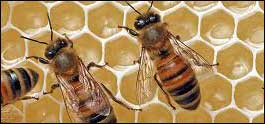 |
082 901 8649 sales@beeteam.co.za |
| Home About Bees Bee Removal Contact Us | |
Bees have aided in Scientific discoveriesIt would seem there is indeed a similarity between both the human brain
and the 'thinking' of a swarm of bees. This is most obvious when bees
are in 'house-hunting' mode. If a suitable home is found then a scout bee will return to the colony
and do an elaborate dance over and over, sharing all the information
on the his chosen spot, such as location, distance from present colony
etc. This encourages other scouts Scientists have likened these similarities to behaviours noticed in
monkeys in which similar studies were done. The difference being that
that the response in the monkey's brain was witnessd by its behaviour.
Bees saving themselves with the help of scienceThe decline of the bee population worldwide is no longer news to anyone. Every community from science to agriculture and the man on the street is aware of the rapid decline in the number of bees. The cause for this fall off in numbers is subject of many a heated debate. But science has finally enlisted the help of the bees to see if it is possible to track the cause. Tiny micro-chip like sensors are being mounted on the heads of bees which are then being left to do what comes naturally as the sensor tracks their movements and the conditions they find themselves in. |
|
 to
visit the site and do inspections of their own.
to
visit the site and do inspections of their own.